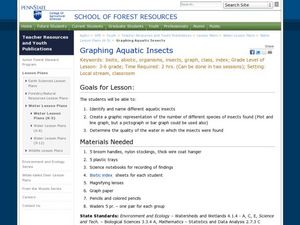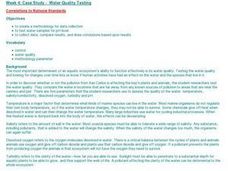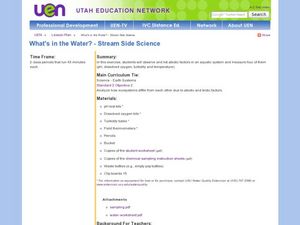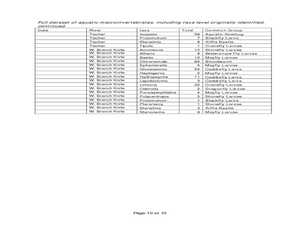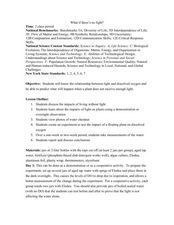Curated OER
Point- vs. Non-point Pollution
Students differentiate between point and non-point pollution and determine how the different types of pollution are harmful to aquatic ecosystems. They complete a series of tests on a sample of "polluted" water and a sample of "pure" water.
Curated OER
Graphing Aquatic Insects
Students identify aquatic insects. In this organism instructional activity, students locate aquatic insects near a local waterway and collect them. Students graph the amount of insects that they collected.
Curated OER
Bottle Habitat
In groups of four, learners construct aquatic habitats in pop bottles. They create charts and record data from observations over a four week period. Then they graph their data and write explanations for what they observed.
Curated OER
Water Quality Testing
Student explore factors affecting ecosystems. They test local water samples for pH level. After creating a methodology for data collection, they collect data, compare results, and draw conclusions based upon results.
Curated OER
The High Cost of Chemical Dependency
Sixth graders explore, analyze and study the effect and impact that humans have on the environment based on their choices as individuals, businesses and governments. They assess the balance between human activities and aquatic pollution.
Curated OER
Photosynthesis and Respiration
Students comprehend the relationship between plants and animals in an aquatic ecosystem. They predict the effects of low dissolved oxygen on the organisms. Students create microcosms with plants, animals, or both. They determine which...
Curated OER
Lake Ecosystem in the Shoal Area
In this lake ecosystem worksheet, students draw a picture of a lake, including weeds, small and big fish, aquatic insects, and micro organisms.
Curated OER
Ecosystems: Give and Take
In this river ecosystem worksheet, students complete a graphic organizer by writing in what the various organisms lists contribute and benefit in this river ecosystem.
Curated OER
Pond Ecosystem Field Trip
Students investigate the environment by participating in a class trip. In this pond ecosystem lesson, students define a list of vocabulary terms associated with ponds such as invertebrate and metamorphosis. Students attend a field trip...
Curated OER
Forest In A Jar
Tenth graders are introduced to the process of succession and gain awareness of the changing nature of ecosystems. They demonstrate a comprehension of the dynamic nature of ecosystems, including the relationship between ecological...
Curated OER
Does Clear Water mean Healthy Water?
Learners test their local aquatic site to determine its water clarity. They collect a water sample and measure its turbidity using a sensor, then they repeat the experiment to obtain a second turbidity reading to find the average value.
Curated OER
The Mighty Hudson Stretches its Mussels
Students brainstorm possible causes of zebra mussel migration and population expansion. They identify the key causes and effects of the disturbance of the Hudson River ecosystem and research causes and effects in the disturbances of...
Curated OER
Make it a habitat
Students consider the adaptation of life forms through natural selection to fill various niches and accommodate changing environmental conditions. They select an ecosystem and conduct research to provide as much detailed information as...
Curated OER
Ecology Community Status
In this ecology community status worksheet, students research their state's ecosystem, make a chart of the biodiversity, analyze the chart and identify issues with wetland species. This page has several links to helpful web resources.
Curated OER
What's in the Water? - Stream Side Science
Here is a complete activity in which young biologists or ecologists test the pH, dissolved oxygen, turbidity and temperature of stream water. The class visits an actual stream and makes observations of the site. They use scientific...
Curated OER
Marine & Aquatic Habitats Activities - Walk in the Wetlands
Students research various types of fresh water wetlands and identify the common animal and plant life in these different ecosystems. They further analyze the need to protect these wetlands and explore their varied uses.
Curated OER
Marine & Aquatic Habitats Activities - Terrestrial Forests vs. Kelp Forests
Students discuss concept and specificity of habitats, both marine and terrestrial, list similarities and differences in the habitats of a kelp forest and a terrestrial forest, compare types of organisms that occupy corresponding types of...
Curated OER
Wetlands Field Trip
Seventh graders used aquatic nets and other equipment to sample organisms in the lake -made plaster casts of footprints found around the edges of the lake -used reference materials to identify all organisms collected -filled out an...
Curated OER
Does a change in pH affect the growth and survival rate of aquatic plants?
Students determine if changes in pH affect the growth and survival rates of aquatic plants. They evaluate the optimal pH levels for the growth of aquatic plants.
Curated OER
Aquatic Invertebrates
Students examine the impact that human development has on streams. In this stream sampling lesson plan students compare macroinvertebrate data and graph it.
Curated OER
Visual Vocabulary
Students interpret and name the vocabulary termed acted out by the mime. In this science/language arts/physical education activity, students are given a set of vocabulary terms to discuss within their group. Next, students place all...
It's About Time
Who Eats Whom?
Packed with visual aids and multiple learning opportunities, an engaging exercise challenges individuals as they explore the role of producers, consumers, and decomposers. After discussing differences between food chains, food...
Curated OER
Wetland Metaphors
Learners describe the characteristics of wetlands and identify their ecological functions. They inspect items and use them to create metaphors about wetlands.
Curated OER
What If There's No Light?
students discuss the importance of light and the consequences of living without it. Using a plant as a demonstration, students predict and observe what happens to a plant when it does not receive enough light. In groups, they experiment...
Other popular searches
- Aquatic Ecosystem Activities
- Aquatic Ecosystems Estuary
- Classroom Aquatic Ecosystem
- Science Aquatic Ecosystems
- Aquatic Ecosystem Models
- Aquatic Ecosystems Demo



